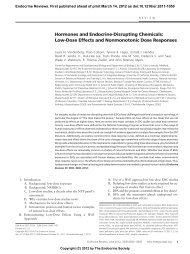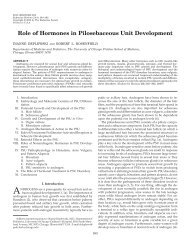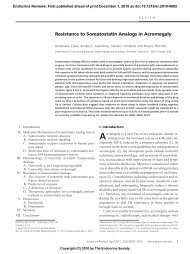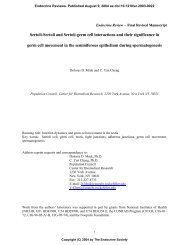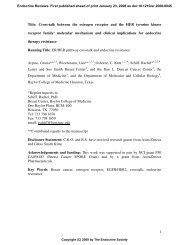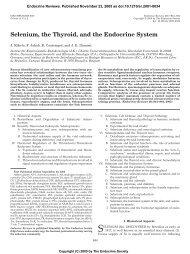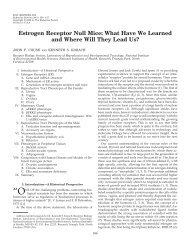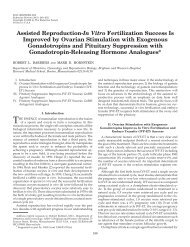1 BETA-CELL FAILURE IN DIABETES AND PRESERVATION BY ...
1 BETA-CELL FAILURE IN DIABETES AND PRESERVATION BY ...
1 BETA-CELL FAILURE IN DIABETES AND PRESERVATION BY ...
You also want an ePaper? Increase the reach of your titles
YUMPU automatically turns print PDFs into web optimized ePapers that Google loves.
56<br />
reduction in HbA1c over 24 weeks, maintaining the glycemic control over the study period.<br />
Proinsulin levels and proinsulin/insulin ratio were significantly reduced with sitagliptin<br />
compared with placebo, suggesting improvement in beta-cell function without additional<br />
weight gain (233).<br />
b- Vildagliptin (LAF – 237)<br />
In preclinical studies, the ability of vildagliptin to augment beta-cell mass by<br />
enhancing endogenous incretin action was assessed in neonatal rats, a model for rapid beta-<br />
cell turnover and growth. Neonatal rats were treated once daily with vildagliptin or vehicle<br />
(control) for 21 days. Vildagliptin increased the number of replicating islet cells<br />
significantly and reduced the number of apoptotic islet cells. Additionally, there was a<br />
significant increase in pancreatic insulin content and beta-cell mass even 1 week after<br />
discontinuation of treatment (234). The head-to-head comparison of vildagliptin with<br />
injectable exenatide on in-vivo beta cell regulation in streptozotocin-induced beta cell<br />
injury in mice, demonstrated that both drugs are equally effective in reducing the<br />
streptozotocin–induced proliferative response, a protective effect against beta-cell injury as<br />
well as in promoting early differentiation of pancreatic progenitor cells, in increasing<br />
formation of ductal beta-cell, and improving glucose tolerance to a similar extent in STZ-<br />
diabetic mice. Furthermore, the effect was maintained after the treatment washout (235).<br />
In clinical studies with vildagliptin, postmeal glucose levels were significantly<br />
decreased but postmeal insulin levels were unchanged (220). Although such findings might<br />
be interpreted to suggest that DPP-IV inhibitors do not improve insulin secretion in patients<br />
with DM2, it should be recognized that circulating insulin levels are not a direct measure of<br />
insulin secretion and that insulin secretion must be considered in the context of ambient<br />
glucose levels. Accordingly, beta-cell function can be improved, without appreciable<br />
changes in circulating insulin levels, particularly if glucose values are reduced (236). The<br />
effect of 4-week treatment with vildagliptin (100 mg, twice daily) on meal-related beta-



